Peking University, October 22, 2021: Against the backdrop of the beautiful Weiming Lake, there stands the
David Packard Pavilion. In one of its cozy apartments lives Prof. Roger
T. Ames, a Canadian-born philosopher and Humanities Chair Professor at
Peking University. Last month, Prof. Ames received the Chinese
Government Friendship Award, the highest award for non-Chinese experts
who have made great contributions to the Chinese society during its
recent astonishing development. Chinese Premier Li Keqiang presented him
with the gold medal as a recognition of his achievements in the
interpretation and promotion of Chinese culture and philosophy on a
global scale. “I’m very honored. Ever since I was eighteen, I’ve been
working in China and (it’s like) coming to the acme of my career,” said
Prof. Ames. Instead of regarding the award as his own, he added that
this achievement “represents a bunch of people who are trying to do the
same thing.” Prof. Ames was also grateful for the nomination provided by
Peking University and the help he had received from his colleagues at
PKU.

Prof. Roger T. Ames
Growing up in Western culture, while falling in love with Chinese culture
At the age of eighteen, Prof. Ames came to China for the first time as
an exchange student and was hugely influenced by his teachers,
especially Lao Sze-kwang (Lao Siguang) and Tang Junyi at the Chinese
University of Hong Kong. When he began learning Chinese philosophy, he
found that Western individualism had its shortcomings when it came to
interpreting complex philosophical questions in the real world. Thus he
started to develop a great interest in the core values of Chinese
culture which was importantly different from his own culture. With the
fundamental concepts of yin and yang, Chinese philosophy is driven by a
kind of correlative, analogical thinking that brings different aspects
of experience together to produce new meaningful events. By contrast,
classical Western philosophy is characterized by a kind of categorical
“thing” thinking on the opposite spectrum from Chinese ecological
philosophy. With the primacy of relationality in this Chinese thinking,
all members of human society, no matter which country or continent they
reside in, are connected and related to each other in more ways than
one. Relations with others is an integral aspect of each individual’s
identity. Prof. Ames supported this claim by emphasizing that
“categorical thinking has be rejected in the twentieth century internal
critique within Western philosophy itself.” While classical Western
ontology is referred to as “the science of being,” Chinese “zoetology”
made explicit in the Book of Changes is “the art of living.” In contrast
with the notion of human beings as something we are, the relations and
changes within nature and society over a lifetime are incorporated into
one’s narrative, and are integral to an ever-evolving process of
“becoming” oneself. In this broader interpretation, individuality is not
where we begin, but the achievement of a person becoming distinctive
and even distinguished through his or her dynamic interaction with other
people in society.
Chinese philosophy, as Prof. Ames has come to understand it, is radical
empiricism. “One way of enabling the world to understand China better
perhaps is to present Confucianism as a distinctively Chinese form of
pragmatism that is unique to China in many of its respects,” suggested
Prof. Ames. Pragmatism as a method is a kind of experimentalism that
seeks different practical ways to progress forward. In this sense, we
could say living, vibrant cultures are necessarily pragmatic, and
Chinese culture offers a fresh perspective with family values at its
core. “In Confucian philosophy, more fundamental than anything else is
family,” commented Prof. Ames, “Family is where one is inspired to give
everything.” To some extent, the entire Chinese society is structured
like a family. For example, students refer to their teachers as shifu
(师父) or shimu (师母), with the two Chinese characters defined as “teacher”
and “father” or “mother” respectively, reflecting the core family
values Chinese culture builds its foundation upon. One of the key moral
imperatives related to family is “family reverence (xiao 孝),” which
entailed not only respecting the elderly but on occasion remonstrating
with them, and again providing assistance when misfortune occurs. This
value is integral to the intergenerational transmission of the living
cultural civilization as its values and practices are embodied
and passed down from one generation to the next.
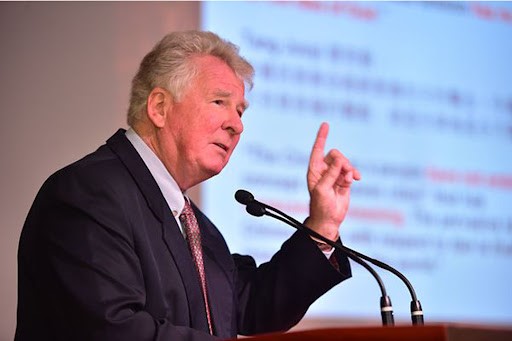
Prof. Ames delivering speech
As a leading non-Chinese scholar in the field of Chinese philosophy,
Prof. Ames attaches great importance to Chinese and Western comparative
philosophy. As he put it, “you need to view the world from as many
different perspectives as you can in order to understand something
truly.” For example, Laozi and Confucius had different opinions, but
they also shared the same cultural foundation that enabled them to
communicate and even disagree within their shared culture. Once they are
viewed through a cross-cultural hermeneutic, however, from the Chinese
perspective we can view the Western suppressed assumptions, and from the
Western perspective, those assumptions shared by Confucius and Laozi.
In contrast to philosophical investigations in Western universities,
Prof. Ames observed that such research is of a kind of comparative
nature at Peking University. “Philosophy in Western universities is
primarily European philosophy, but the kind of philosophy we do at
Peking University challenges cultural chauvinism. Good philosophy, in
its breadth, is a global subject,” remarked Prof. Ames.
When it comes to research on Chinese and Western comparative philosophy
at Peking University, he spoke highly of its continuing development. For
one thing, many of his colleagues at PKU Department of Philosophy and
Religious Studies have had the experience of studying abroad. When they
return, they bring Western theories to compare and contrast with
traditional Chinese philosophy, thus propelling the progress of academic
exchange. Again, students majoring in philosophy at PKU are required to
read philosophical texts in the original languages, engaging their
subject material at its core and evaluating texts with deliberate
accuracy.
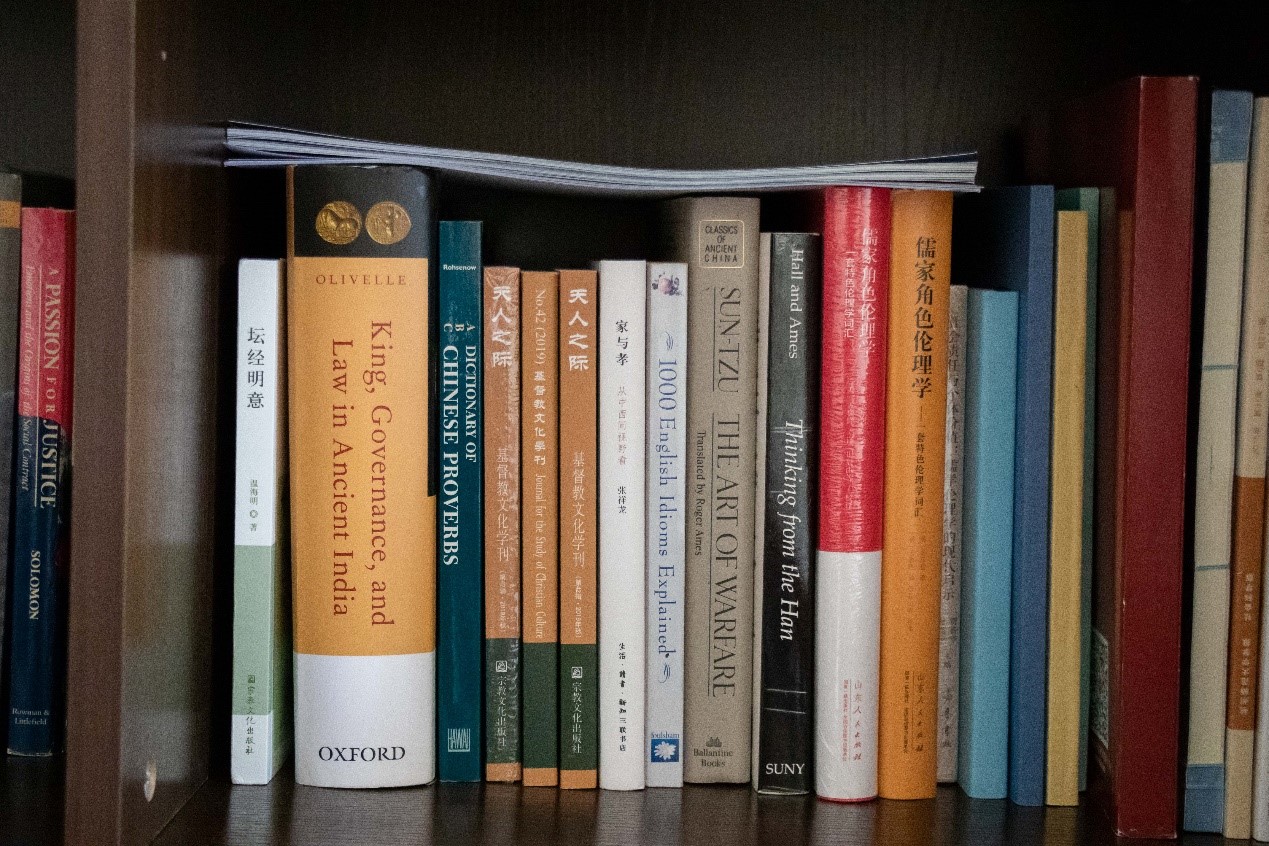
A glimpse of Prof. Ames’ Bookshelf
Interpreting and promoting Chinese culture and philosophy in Western countries
As a renowned expert on Chinese and Western comparative philosophy,
Prof. Ames has authored Thinking Through Confucius, Anticipating China:
Thinking Through the Narratives of Chinese and Western Culture and
Thinking from the Han: Self, Truth, and Transcendence in Chinese and
Western Culture among other well-known works. He has also translated
many Chinese classics, including The Analects of Confucius: A
Philosophical Translation, Sun Tzu: The Art of Warfare and Dao De Jing: A
Philosophical Translation. “When I translate (Chinese texts) into
English, I try to understand what is in the mind of the audience. I try
to anticipate how they’re going to respond to the language I choose,”
said Prof. Ames, “My approach to research on Chinese philosophy is to
try to stand on both sides of the looking-glass, and to understand what
both sides are attempting to say as a basis that will allow for mutual
understanding.” Many of his books have been collaborative works as an
object lesson in a Confucianism that is committed to cooperation with
other people”.
Prof. Ames has also been dedicated to helping others in addition to
conducting his own research on Chinese philosophy. He was proud that in
his career at the University of Hawai’i he has been the supervisor of
more than 50 PhD students who have gone on as professors in their own
right teaching Chinese philosophy all over the world. Furthermore, he
has offered a platform for other scholars to express their ideas by
being a former editor of two journals - Philosophy East and West and
China Review International, as well as the editor of the SUNY series on
“Chinese Philosophy and Culture” published by the State University of
New York Press that now has more than 200 titles. Aiming to spread the
knowledge of Confucianism as an international resource for shaping a new
world cultural order, he also became the president of the World
Consortium for Research in Confucian Cultures.
There are many Chinese scholars devoted to the interpretation and
promotion of Chinese culture and philosophy, and we must work together
to enable a western public to better understand this living tradition.
At Peking University, Prof. Ames considers himself as a “bridge” that
helps young graduate students – the potential professors of the next
generation – to learn a vocabulary and a framework through which they
can take the unparalleled tradition of Chinese philosophy at Peking
University and make it comprehensible to a Western audience. At Peking
University, he is committed to offering Chinese students a method of
representing Chinese philosophy to people from other countries as they
themselves in their own narratives become international scholars.
Prof. Ames proposed two major reasons why the interpretation and
promotion of Chinese culture and philosophy in Western countries has not
been an easy thing to do. First, many Western people have come to
understand Chinese culture in a distorted way because most of the early
translators of Chinese classics were missionaries. By transforming the
core concepts of Chinese philosophy to promote their religious mission,
they have converted Chinese philosophy into an Eastern religion. Thus,
in the bookstores and libraries, Chinese philosophy is shelved under
religion rather than philosophy. Again, the framework used in the
Chinese academy was imported from abroad in the 19th century when
education in East Asia adopted the Western institutions and curriculum,
and invented a new language to synchronize Asian languages with Western
modernity. As a consequence, both Western and Chinese scholars tend to
use a Western framework to theorize Chinese philosophy. This practice
has led to, for example, using a language that was created to express a
Western conception of the transcendent universalism we find in classical
Greek philosophy and Abrahamic theology to express what in fact
shared but still pluralistic values. The challenge is to allow the
tradition to speak on its own terms and with its own voice to overcome
previous mistranslations and to avoid further misunderstandings.
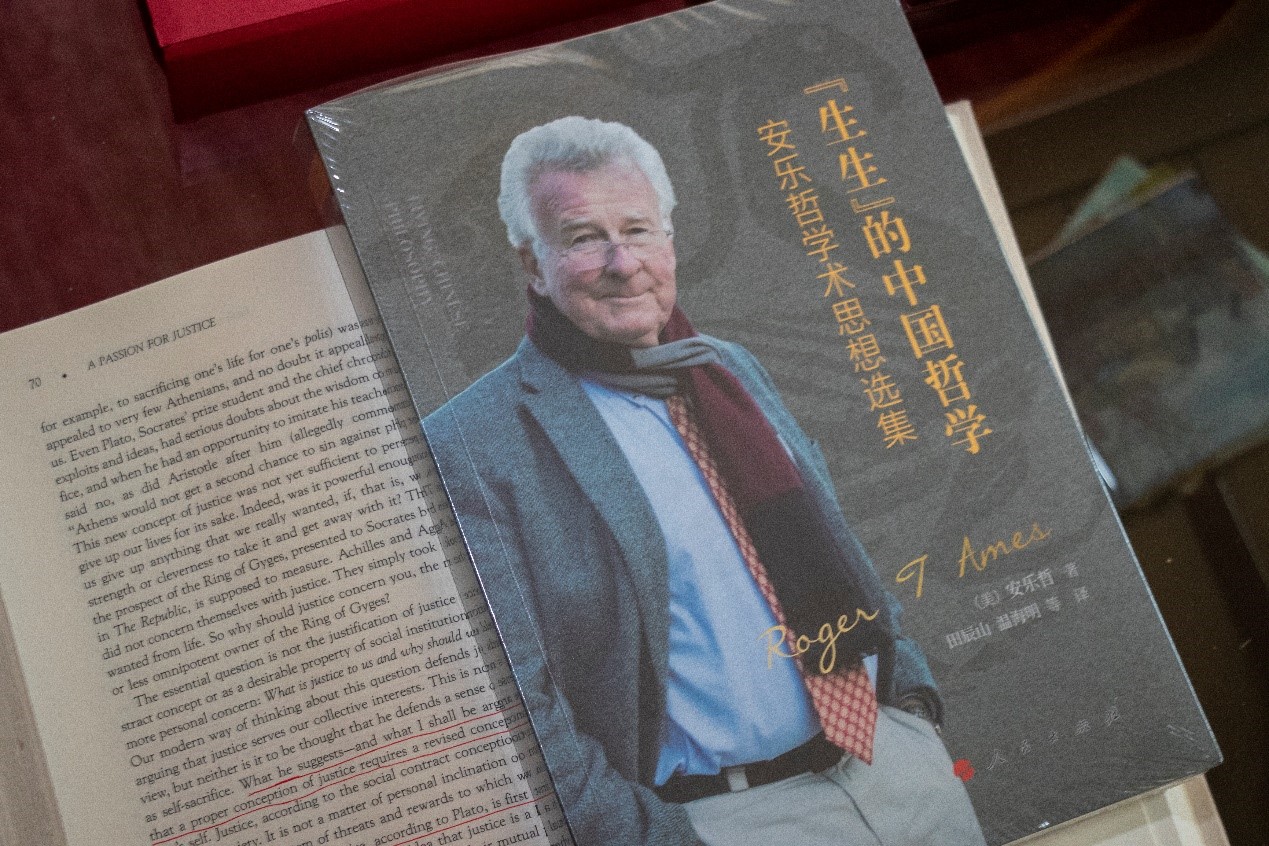
A new book authored by Prof. Ames
Witnessing the development of China and wishing for a better world
“It's just incredible what’s happening.” It has been more than half a
century since Prof. Ames came to China for the first time, and a lot of
changes have taken place in the country. As a witness of the
modernization of China, Prof. Ames admires the tremendous growth
unprecedented in human history that China has experience during a span
of less than 30 years. Prof. Ames is most impressed by China’s strategy
for poverty alleviation, and sees it as something that all countries
could benefit from by understanding the Chinese experience. The
large-scale poverty alleviation programs implemented by the Chinese
government have helped people to rise out of poverty, setting a contrast
with many developed countries in which there is still a strong and
unforgiving polarization of wealth.
When it comes to relations between China and Western countries, Prof.
Ames also had his insights, “We should anticipate that if someone does
not understand something, and it has the potential to affect them, they
become afraid of it. So, with China’s sudden rise, it has startled a
developed world dominated by liberal values.” Since China can no longer
be ignored, in trying to anticipate the future, they read China’s growth
through their own histories, a history of imperialism. Perhaps the most
fundamental problem is the asymmetry in understanding between China and
the rest of the world. Chinese people have long been out in the world,
and have brought their understanding of it home. But there have not been
many Western people who have done the same. “This asymmetry is really a
problem.” The example he gave is how every Chinese bookstore and
library is full of translations of the contemporary avatars of Western
culture and civilization, but the great thinkers of China are poorly
represented within the Western world. The lack of knowledge about China
has led to misunderstandings. In our best efforts at globalization, he
advocates we should use “our differences to make a difference,” looking
for relational equity and an achieved diversity which are such important
ideas in Confucianism.
When asked if the Chinese approach to an inclusive, shared global
governance grounded in Chinese culture and philosophy would work and
make the world a better place to live in, Prof. Ames answered “I hope
so.” To take the Belt and Road Initiative as an example, he underlined
the cultural element of such initiatives that must set the standard for
what is working and what is not.
Prof. Ames is also concerned that we were living in an era of crisis.
The unprecedented COVID-19 pandemic is just the first among many
problems, with issues such as global warming, environmental degradation,
population explosion, international terrorism, income inequities, proxy
wars, massive refugee immigration, and so on, coming right behind.
During this era of crisis, the world will require all human
civilizations to work together and move forward in a new direction. He
allowed that Confucianism cannot solve all the problems, but it must
have its place at the table. One of its most important contributions is
that it offers an alternative to Western individualism. The fact that
East Asian countries and particularly China have been successful in the
fight against the epidemic is due to an alternative understanding of
what it means to be a person in community derived from Confucianism.
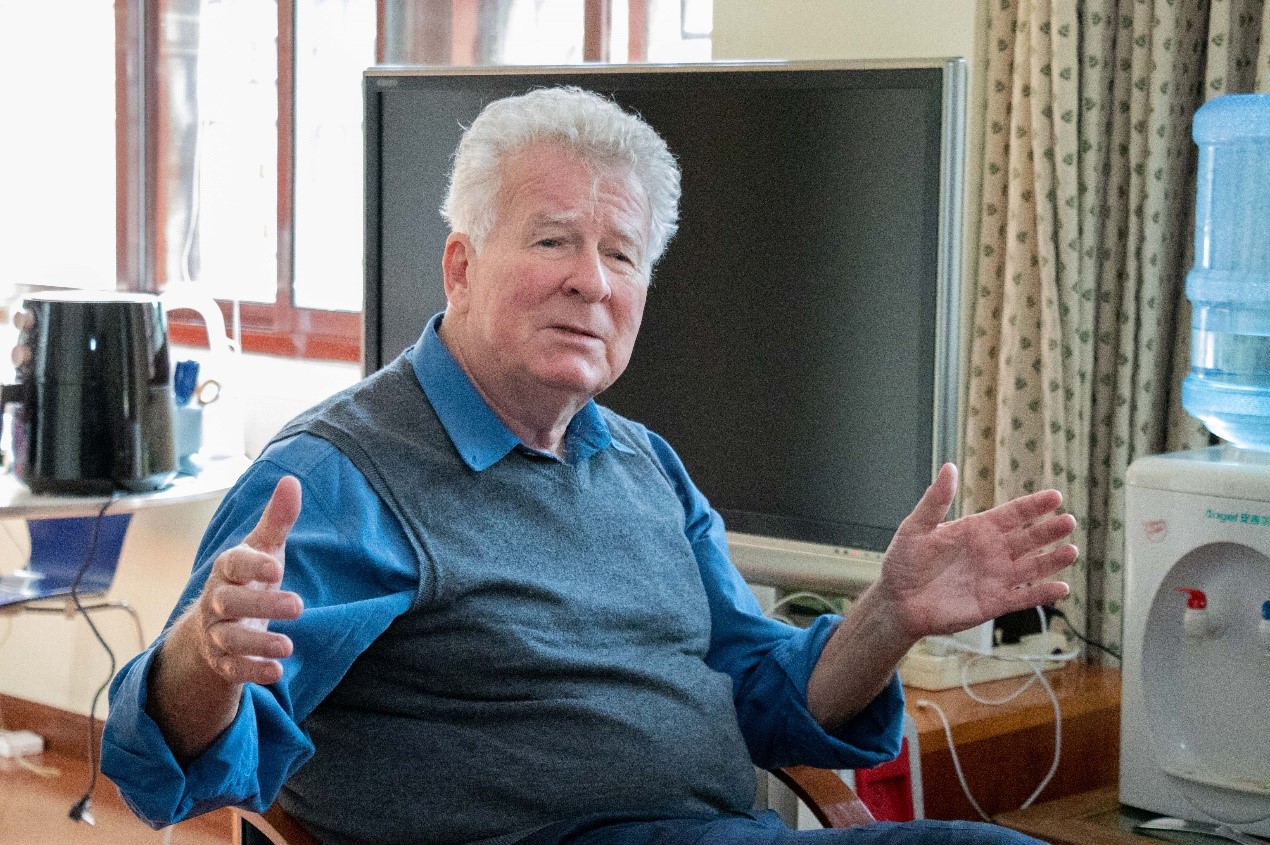
Prof. Ames being interviewed
Prof. Ames’ close ties with Peking University
“I’m a walking advertisement for Peking University.” In 1985, Prof. Ames
came to Peking University for the first time. Six years ago, he
relocated to PKU and became a teacher and researcher after his
retirement from the University of Hawai’i. He has happily embraced PKU
with its rich tradition of Chinese culture and philosophy. “You can’t
understand modern Chinese history without understanding Peking
University. Peking University has been an important player in an
ever-evolving Chinese history,” remarked Prof. Ames, “Students at Peking
University have a sense they are responsible for China’s future.” When
historic events have happened in China, with examples such as the May
Fourth Movement students at Peking University have stood up. At our
current turning point of history, he stated that “while Peking
University is quickly become one of the world’s leading seats of
learning, at the same time it has to retain its own identity, its own
history, and its own tradition.”
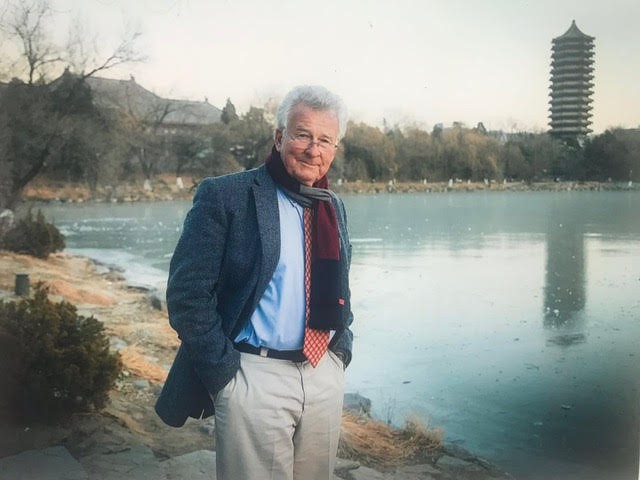
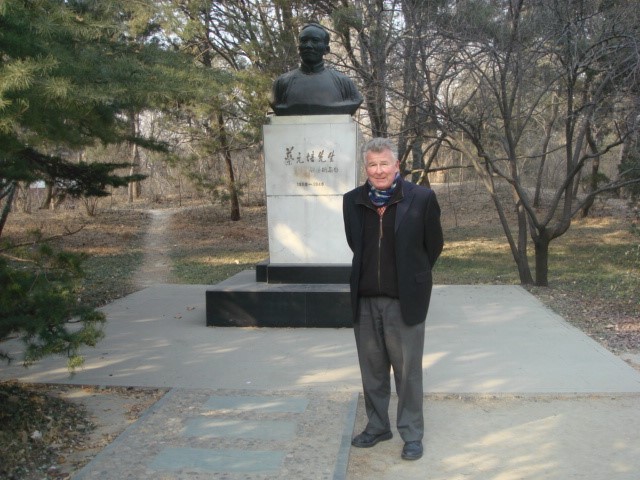 Prof. Ames at Peking University
Prof. Ames at Peking University
Over
his extensive teaching career, Prof. Ames regards his teaching
experience to be somewhat different at PKU from other universities at
which he has taught mainly due to cultural factors. Western students
tend to be more independent, while Chinese students are perhaps more
concerned about their responsibilities. “The classroom culture is
different. Chinese classroom is more like a family.” He also spoke
highly of the students at Peking University for their diligence and
their foreign language skills. Prof. Ames have always aimed to bring the
culture of a Western classroom to Peking University, “When I come here,
I teach like I would in Hawai’i.” For him, teaching is a form of
learning. Prof. Ames explained the essence of teaching by telling us
that when he taught in Hawaii, at the end of a semester, he asked his
students “Who learned the most in this seminar?” On hearing his
question, all the students proceeded to point at the most brilliant
student in the classroom, but he surprised his students by saying that
it was in fact he who had learned the most, and the brilliant student
would have to wait her turn. Prof. Ames believed that “The teacher has
to be the best student in the class.” It must be this attitude that has
made him one of the most popular professors among students at Peking
University.
As a professor of Chinese philosophy and a translator of many Chinese
classics, Prof. Ames has made an outstanding contribution to the
translation, research and promotion of Chinese culture and philosophy as
well as Chinese and Western comparative philosophy. When asked about
his future plans, Prof. Ames quoted the words of his late friend and one
of his former collaborators, David L. Hall, “If you live your life
right, what you want turns out to be just more of the same.” With all
humility, Prof Ames, will continue to shine a light on the cultural
exchanges between China and the world, and continue with his excellence
as a world-renowned professor to influence generations of young scholars
yet to come.
Written by: Zhou Siyan
Edited by: Rose Li, Zhang Jiang






